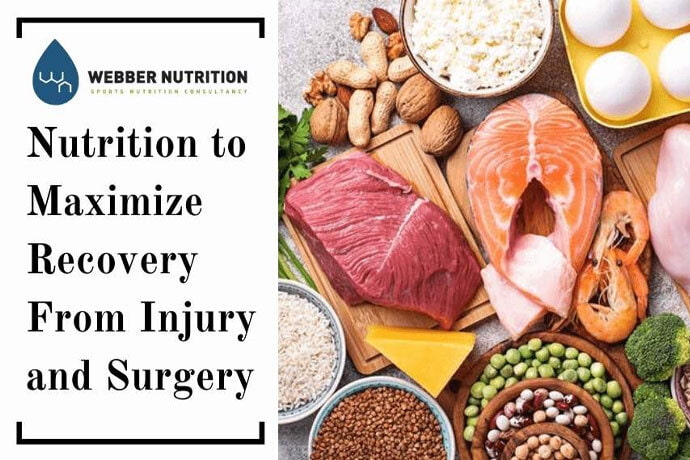Periods of inactivity and immobilisation that is caused by injury and corrective surgery may result in significant losses in muscle mass, strength and function. Depending on the severity of an injury, sport and physical activity participation are reduced or completely restricted, therefore limiting the anabolic stimulus of exercise to support protein synthesis. Therefore you need to follow a strict post surgery diet to alleviate reductions in lean tissue and simultaneous gains in unwanted fat mass. Individualised nutritional strategies should be aligned to stimulating the healing process of a particular injury whilst meeting the energy demands of a person’s activity levels. With this in mind, here is a list of foods that promote healing after surgery.
- Recovery Foods Should Focus on Energy Balance
- Protein and Amino Acid: Nutrition for Injury Recovery
- Importance of Omega 3 for Injury Recovery
- Creatine: Food for Improving Strength
- Micronutrients: Injury Healing Foods
- Foods to Avoid During Injury Rehabilitation
- Conclusions
- FAQs:
- What helps you heal faster after surgery?
- What supplements help ligaments heal?
- What are the best foods to eat after surgery?
- What vitamins help repair torn muscles?
- What not to eat for wound healing?
- Can I drink coffee after surgery?
- How important is nutrition for injury recovery?
- How long does it take for muscles to repair after an injury?
- Which fruits are best for wound healing?
Diet After Surgery For Energy Balance
Energy balance is critical during recovery. Chronic energy restriction drastically slows down recovery by impairing the wound healing process and worsening muscle loss. On the other hand, positive energy balance may also negatively impact muscle health. To increase lean mass in exercising populations it is recommended to consume a diet in surplus of energy demands, but a positive calorie intake may influence excess inflammation when limbs are immobilised. Furthermore, high calorie diets may also lead to increases in body fat, both of which may be linked to impaired insulin sensitivity and fat utilisation due to decreased activity. Therefore daily energy intakes should be calculated to match individual requirements.
Protein and Amino Acid: Nutrition for Injury Recovery
Dietary protein intake is fundamental for skeletal muscle development, especially during periods of inactivity to prevent significant losses of mass, strength and function. Dietary protein sources that are rich in EAA (Essential amino acids) like fish, meat, milk, egg and meat are some of the best foods to eat after surgery.
Muscle protein synthesis (MPS) must be greater than muscle protein breakdown (MPB) to increase muscle mass and strength, and this can be reversed when MPB exceeds MPS. Muscle protein synthesis (MPS) must be greater than muscle protein breakdown (MPB) to increase muscle mass and strength, and this can be reversed when MPB exceeds MPS. During muscle disuse (just 14 days), resting and fasting rates of MPS are decreased meaning a greater intake of protein is required for the same stimulatory response. With this in mind, daily protein intakes of 2.5-3g per kg of body mass may be required to prevent substantial losses of skeletal muscle mass.
Essential amino acids (EAA) are required to maximally stimulate MPS in response to protein consumption, and so choosing dietary protein sources that are rich in EAAs is important to enhance MPS for that meal. The branched-chain amino acid (BCAA), leucine, is thought to further improve MPS and may also be beneficial during injury. Therefore consuming a high protein diet that contains foods rich in EAAs, and possible supplementation of leucine is recommended to maximise MPS and reduce losses of muscle mass and strength when immobilised through injury.
Importance of Omega 3 in a Diet for Healing
Omega-3 fatty acids offer vital anti-inflammatory and immune-boosting properties that promote healing after surgery. Excessive inflammation may require supplementation of omega-3, however, injury healing foods like salmon, mackerel, sardines and trout should not be overlooked and should be consumed regularly (3-4 times per week) ahead of supplementation to support wound healing. Omega-3 also contributes to MPS and may reduce losses in muscle during physical inactivity. Omega-3 also plays a role in cognitive health, and this may benefit injuries to the head by reducing inflammation caused by a concussion or related injuries.
Creatine: Food for Improving Strength
Creatine is well known for its use as a nutrition supplement for improving strength during resistance exercise training. There is little evidence to support creatine as a nutritional strategy in preventing muscle loss during inactivity. However, it may prove useful in reducing impairments to training-induced adaptations in the mitochondria (powerhouse in the muscle cells). Furthermore, creatine supplementation has been shown to improve gains in muscle size and strength during rehabilitation following injury, but not during immobilisation.
Micronutrients
Micronutrient deficiencies should be avoided at all times to promote health and performance, and it’s important to remember that more is not always better. Supplementation is not necessary if sufficient nutrients are sourced from the diet. The main exception being vitamin D as sunlight exposure is difficult for many months of the year in the UK. Calcium and vitamin D are important for healing especially for bone related injuries for optimal bone formation. Antioxidants are also a popular supplement that many consider beneficial to reduce free radical production and assist in recovery. However, taking antioxidant (vitamin C & E) supplementation on top of an adequate supply from the diet does not further improve recovery from surgery.
What Food to Avoid After Surgery
The thing people usually want to know for optimal recovery is what can they take to speed it up, but another important consideration is what should be avoided to prevent slowing it down. The usual culprits will always come under this topic – alcohol, heavily processed foods and too much of any one thing. Excess refined sugars should also be avoided to prevent unwanted weight gain but it may also increase inflammation and counteract anti-inflammatory effects of fish oils. As previously mentioned, calorie intake should be controlled to avoid positive energy intakes. Lastly, although it plays a vital role in recovery, too much omega-3 so soon after injury/surgery may also markedly depress the inflammatory response as some inflammation is required for recovery to allow blood and nutrient transport to the injured area.
Conclusions
When you’re injured it’s important to focus on a balanced, nutrient-rich diet that meets your energy requirements.
- Calculate calorie requirements to match activity levels, likely based on basic metabolic rate (BMR).
- Consume a high protein diet of 2.5-3g per kg body mass that is sourced with foods rich in EAA.
- Supplementing with EAA may enhance MPS if a particular meal does not contain foods rich in EAA or leucine (meat, fish, eggs, milk).
- Supplementing with creatine may promote recovery during rehabilitation, but not during immobilisation.
- Eat oily fish 3-4 times per week get a sufficient supply of omega-3 fatty acids.
- Avoid micronutrient deficiencies by eating a rainbow of foods through a range of colourful fruits and vegetables.
- Supplement with vitamin D during winter months, or if your injury stops you from going outside.
- Focus on naturally sourced foods, avoid heavily processed foods and refined sugars and limit alcohol intake as much as possible. The odd glass of wine won’t hurt but not in large consumptions.






